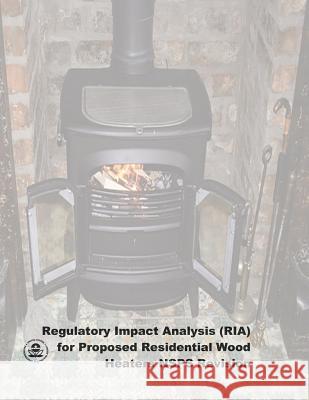Regulatory Impact Analysis (RIA) for Proposed Residential Wood Heaters NSPS Revision: Final Report » książka
Regulatory Impact Analysis (RIA) for Proposed Residential Wood Heaters NSPS Revision: Final Report
ISBN-13: 9781507667873 / Angielski / Miękka / 2015 / 224 str.
The U.S. Environmental Protection Agency (EPA) is proposing to revise new source performance standards (NSPS) for residential wood stoves, and to issue NSPS for pellet stoves, furnaces, hydronic heaters, and masonry heaters. The EPA is proposing this revision under the authority of section 111 of the Clean Air Act (CAA), "Standards of Performance for New Stationary Sources," under which the EPA establishes federal standards of performance for new sources within source categories which cause or contribute significantly to air pollution, which may reasonably be anticipated to endanger public health or welfare. We are proposing to amend 40 CFR part 60, subpart AAA, Standards of Performance for New Residential Wood Heaters. The current regulation (subpart AAA) applies to affected facilities manufactured since 1988. Except as discussed in this proposal, the current requirements would remain in effect for the heaters/stoves and model lines manufactured before this proposal. We also propose to broaden the applicability of the wood heaters regulation beyond adjustable burn rate heaters (stoves, the focus of the original regulation) to specifically include single burn rate heaters, hydronic heaters, and pellet stoves. Heaters/stoves and model lines manufactured after the compliance dates would be required to meet particulate matter (PM) standards. Compliance upon the effective date of the final rule is the intention in section 111 of the CAA. Revision of the current residential wood heaters NSPS is necessary to capture the improvements in performance of such units and to include additional wood-burning residential heating devices. The proposed changes are expected to achieve several objectives, including the application of updated emission limits reflecting the best industry emission reduction systems; elimination of exemptions over a broad suite of residential wood combustion devices; the strengthening of test methods as appropriate; and the streamlining of the certification process. These proposed revisions help address the health impacts of particle pollution, of which wood smoke is a contributing factor in many areas. Particulate pollution from wood heaters is a significant national air pollution problem and human health issue. Health benefits associated with these proposed regulations are valued to be much greater than the cost to manufacture cleaner, lower emitting appliances. These proposed regulations would also significantly reduce emissions of many other pollutants from these appliances, including carbon monoxide, volatile organic compounds, hazardous air pollutants and climate-forcing emissions. Emissions from wood stoves occur near ground level in residential communities across the country, and setting these new requirements for cleaner stoves into the future will result in substantial reductions in exposure and improved public health.
Zawartość książki może nie spełniać oczekiwań – reklamacje nie obejmują treści, która mogła nie być redakcyjnie ani merytorycznie opracowana.











